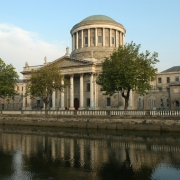RECENT HIGH COURT DECISION – REFUSAL OF REFUGEE FAMILY REUNIFICATION FOR NON-MARITAL PARTNER
Ms Justice Bolger of the High Court has recently delivered a judgement in the case of O v Minister for Justice [2022] IEHC 617.
The case concerned a Nigerian citizen who applied for refugee family reunification for his non-marital partner and three children in Nigeria pursuant to s.56 of the International Protection Act 2015. The applications for his children were granted, however the application for his partner was refused. The applicant sought to challenge this decision by way of judicial review proceedings in the High Court, seeking to quash the decision. The Court refused the application and did not grant the relief sought.
The application was refused on the basis that s.56(9) of the 2015 Act only permits unification with a marital partner, whilst the applicant’s partner was not married to him. Non-marital partners are covered by a separate administrative non-EEA Family Reunification policy.
The applicant claimed that s.56(9) is repugnant to the provisions of the Constitution and incompatible with EU law and the State’s obligations under the ECHR. He applicant also claimed that the administrative policy would not afford him reunification with his partner because he was unable to comply with its financial requirements. He argued that limiting statutory family reunification to a spouse will unfairly split non-marital families by leaving one parent isolated from the other and their children. The applicant argued that this limitation is contrary to Articles 40.1 and 40.3 of the Constitution on the right to equality and Article 41 family rights, as well as his rights under the ECHR to non-discrimination. The applicant also sought constitutional protection for his right to cohabit.
The Court rejected the argument that the applicant was being treated less favourably than a married refugee who has been separated from their spouse. The Court in making this determination considered the Minister’s submissions that the applicant was married to a third party and that this marriage had not been dissolved. The Court was satisfied that the applicant’s status is therefore that of a married person and he could not assert a constitutional right to equality of a non-married person to be treated equally to a married person.
The Court did not accept the assertion by the applicant that his non-marital relationship is akin to the marital relationship that is recognised under Irish law. The Court stated that insofar as the applicant contended that the relationship between him and his partner was akin to marriage, it could only be akin to a polygamous marriage, which is not recognised in Irish law.
In considering the applicant’s argument that there is a constitutional right to cohabit, the Court rejected that such a right existed. The Court further concluded that no EU rights are engaged in the application of s.56 of the 2015 Act and therefore the ECHR is not applicable.
The Court therefore found that it is not unlawful that unmarried partners are not included as family members under s.56 of the Act. The Minister has discretion in assessing the extent of family reunification to be afforded to refugees and is entitled to limit this. The Court found that applicants have a non-statutory procedure which they can use to apply for their unmarried partners, via a long-stay visa application, asking the Minister to disapply financial criteria if necessary. The Court found that the State had not breached the applicant’s constitutional rights by providing a different, and potentially more restrictive, non-statutory administrative policy for non-marital family reunification.
The full judgement can be found here:
This blog article has been prepared on the basis of current immigration law and policy, which is subject to change. Please keep an eye on our blog and Facebook page where articles relating to updates and changes in immigration law and policy are regularly posted.


